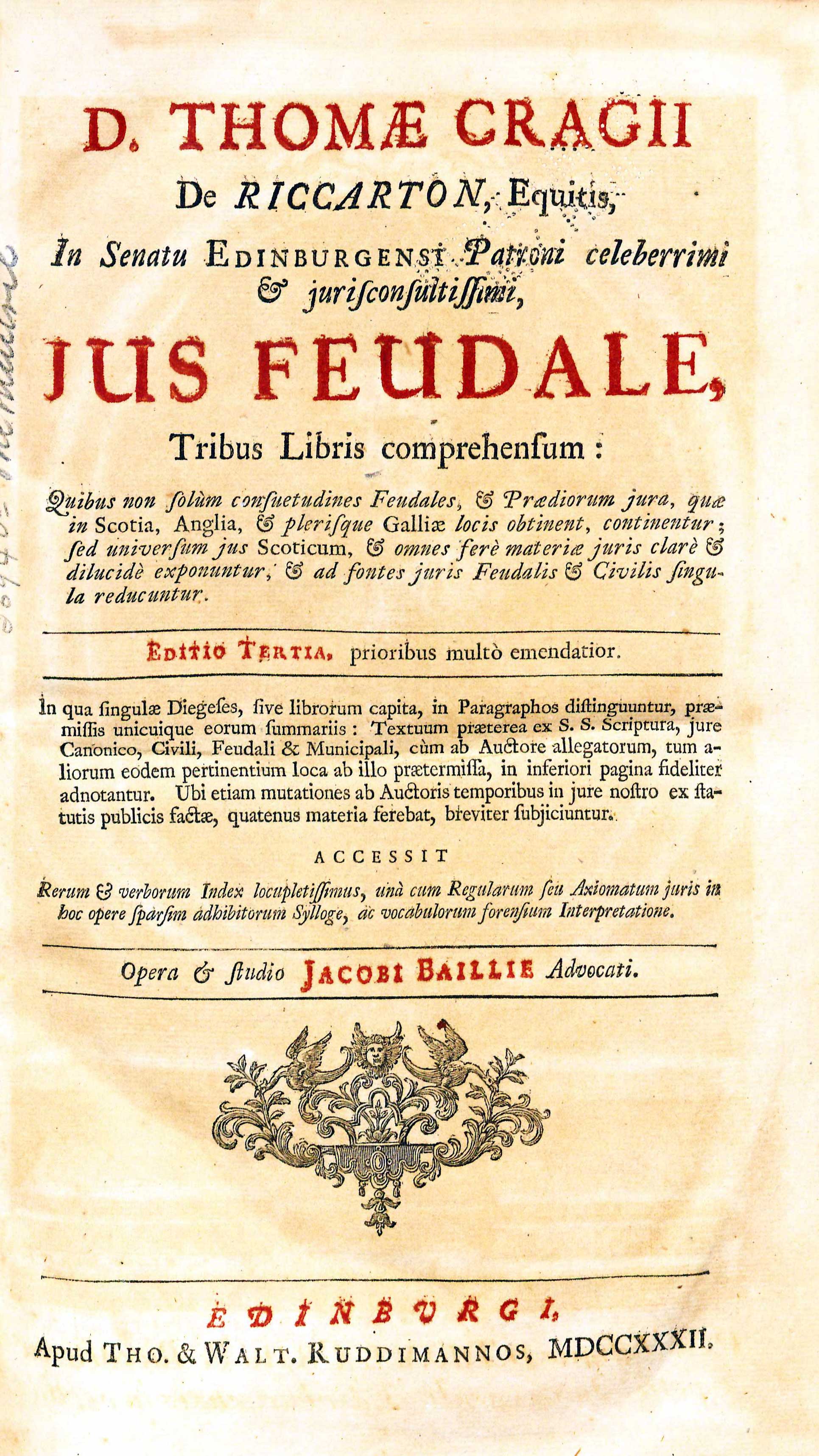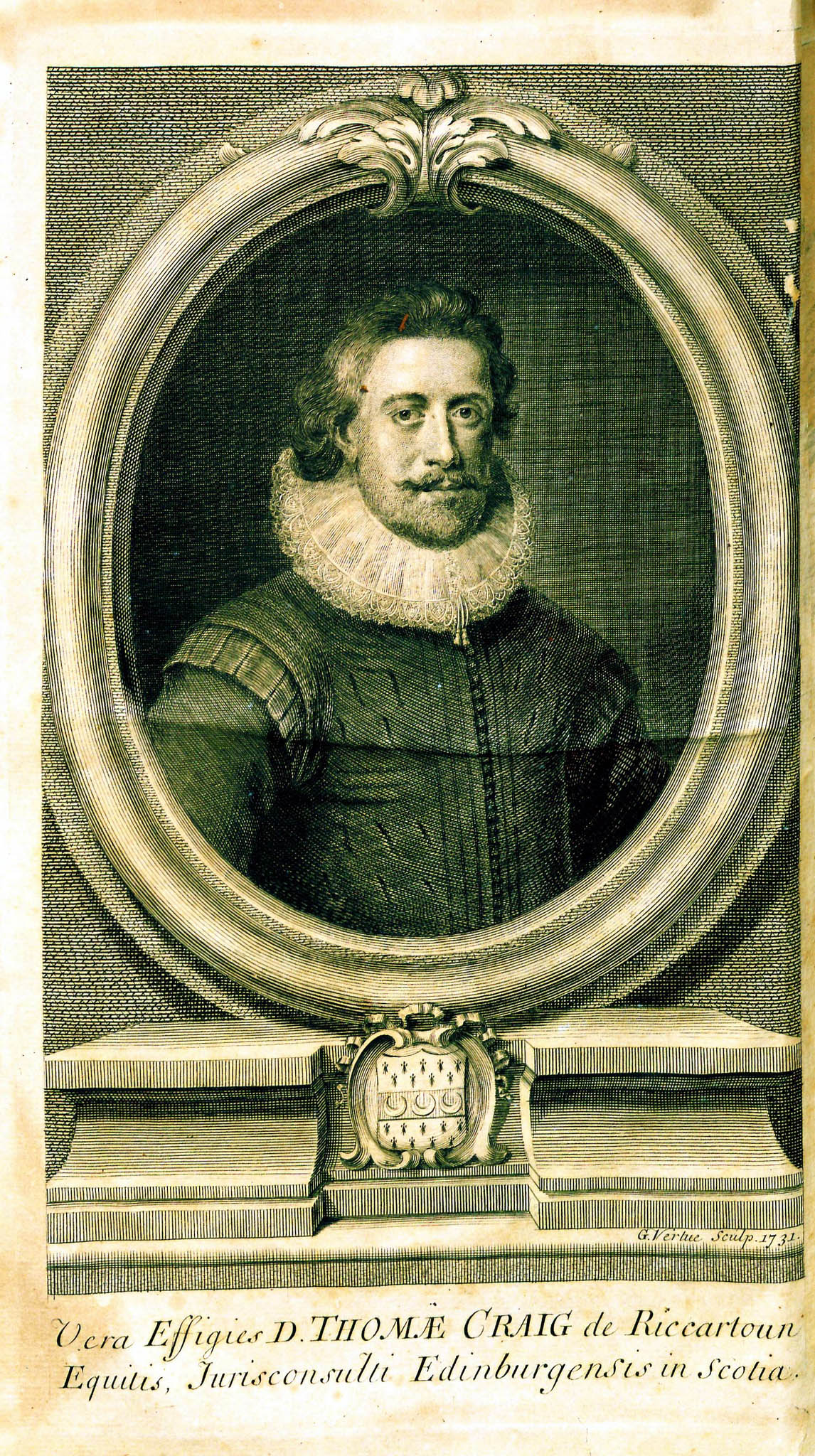Jus Feudale: Tribus Libris Comprehensum
by Sir Thomas Craig
| Jus Feudale | |
|
Title page from Jus Feudale, George Wythe Collection, Wolf Law Library, College of William & Mary. | |
| Author | Sir Thomas Craig |
| Published | Edinburgi: Apud Thos. & Walt. Ruddimannos |
| Date | 1732 |
| Edition | Third |
| Language | Latin |
| Pages | [2], xxii, 524, 52 |
| Desc. | Folio (31 cm.) |
| Location | Shelf F-4 |
"[He] probably started work on Jus feudale in the late 1590s and there is considerable internal evidence to suggest that much of it was written in 1600. There was at least one revision, probably in 1606. The culmination of a lifetime's professional involvement in Scots law, it was enriched by frequent allusions to practice. Written in admirably clear Latin (which the poor English translation represents rather miserably), it is a typical humanistic work in its classical quotations and references and historical and philological discussions. That it originated in a patriotic concern for Scots law is revealed by Craig's stated Ciceronian aim of reducing that law to an ordered science, thereby making it easier for students to learn. He achieves this admirably, writing an accessible, learned, and well-structured work, in which he stresses the feudal origins of much Scots law (and English law too), and from that basis explains and expounds his subject in a logical fashion. He ultimately validates Scots law and its practices in the law of nature and nations in a way that to some extent anticipates Grotius... Craig's systematic account of feudal land law and its principles influenced numerous later Scottish writers... but also had an impact on English legal writers and on English understanding of the history of the common law."[2]
Evidence for Inclusion in Wythe's Library
Listed in the Jefferson Inventory of Wythe's Library as "Cragii Jus feudale.fol." This was one of the books kept by Thomas Jefferson and later sold to the Library of Congress in 1815. The Brown Bibliography[3] includes the 1732 edition, based on Millicent Sowerby's entry in Catalogue of the Library of Thomas Jefferson,[4] while George Wythe's Library[5] on LibraryThing indicates "precise edition unknown; folio editions were published in 1655 and 1732." The Wolf Law Library moved a copy of the 1732 Edinburgh edition from another rare books collection to the George Wythe Collection.
Description of the Wolf Law Library's copy
Recently rebound in period style. Spine features four bands with gilt rules with green label. Title page punched "Biddle Library Univ. Penn." Purchased through the generosity of Daniel W. Baran and Lena Stratton Baran, Class of 1936.
Images of the library's copy of this book are available on Flickr. View the record for this book in William & Mary's online catalog.
Full text
- Jus Feudale (64MB PDF)
See also
References
- ↑ John W. Cairns, "Craig, Thomas (1538?–1608)" in Oxford Dictionary of National Biography, Oxford University Press, 2004; online ed., Jan. 2008, accessed 8 July 2013.
- ↑ Ibid.
- ↑ Bennie Brown, "The Library of George Wythe of Williamsburg and Richmond," (unpublished manuscript, May, 2012) Microsoft Word file. Earlier edition available at: https://digitalarchive.wm.edu/handle/10288/13433
- ↑ E. Millicent Sowerby, Catalogue of the Library of Thomas Jefferson, (Washington, D.C.: The Library of Congress, 1952-1959), 2:210 [no.1766].
- ↑ LibraryThing, s.v. "Member: George Wythe," accessed on June 27, 2013, http://www.librarything.com/profile/GeorgeWythe


